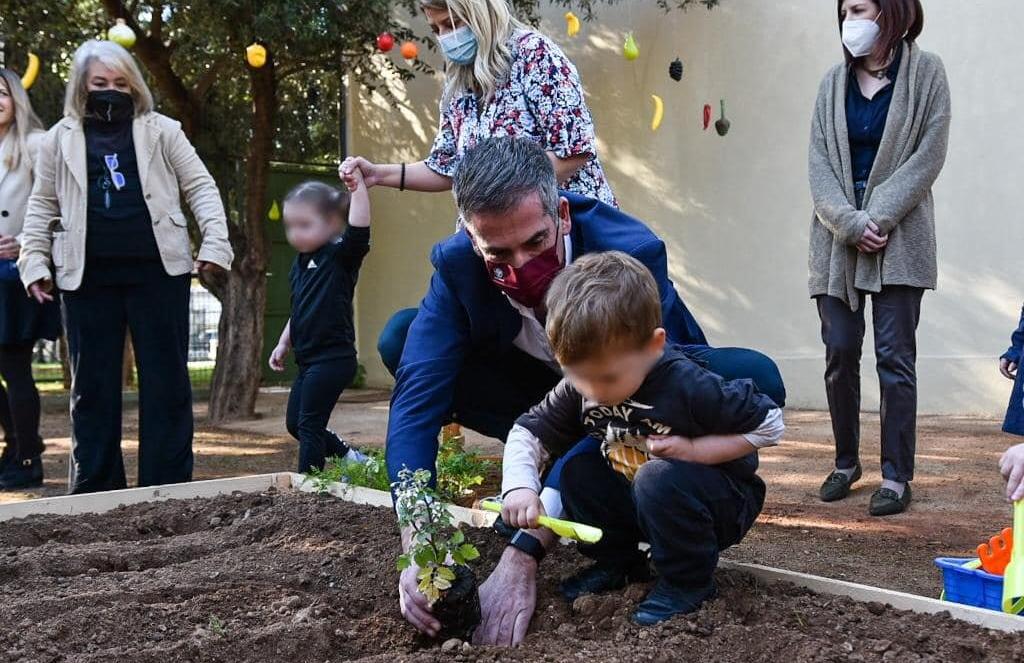Thessaloniki gets ready for its metro launch in November
The underground rapid transit lines have been under construction for almost two decades due to various project delays
 TheMayor.EU logo
TheMayor.EU logo 
Mayor Bakoyannis planting vegetables and fruits with children, Source: Kostas Bakoyannis on Facebook
The municipality wants to have gardens in all 68 of its nursery schools by the end of the year
On 20 April, the Mayor of Athens Kostas Bakoyannis visited the Botanical Nursery School on Spyrou Patsi Street. There, he planted the first citrus fruits, herbs, and vegetables in the nursery’s “junior” garden alongside children and teachers. The Botanical Nursery School is one of seven that has a courtyard garden where children can learn about sustainable food systems.
The establishment of the seven junior gardens is part of the municipality’s participation in the European programme, FUSILLI (Fostering the Urban food System transformation through Innovative Living Labs Implementation). According to the Greek capital, one of the main goals of the FUSILLI programme is to teach children, from a very young age, about the production of food with high nutritional value in urban areas.
“The needs of the children show us the way and lead us to innovative practices. Today, I had the pleasure of standing next to the little gardeners of the Botanical Nursery School and planting vegetables, aromatic plants, and citrus fruits with them, learning from them the benefits of urban cultivation as a good practice for everyone and especially for the children themselves,” Mayor Bakoyannis shared in a press release.
Going further, he explained that the municipality’s aim is to expand the project by establishing “junior” gardens in all of the 68 nursery schools in the city. In this way, the capital seeks to ensure that all preschool children have the opportunity to learn about the production of food and the benefits of sustainable nutrition in urban areas.
It is important to note that, in addition to Athens, 11 other cities are also being supported by the FUSILLI programme. More specifically, the 12 participants are Tampere, Oslo, Kolding, San Sebastian, Castelo Branco, Turin, Rijeka, Rome, Kharkiv, Nilufer-Bursa, and Athens.

The underground rapid transit lines have been under construction for almost two decades due to various project delays

Now you can get your wine in Talence by paying directly in Bitcoin

That’s because the state has to spend money on updating the railway infrastructure rather than subsidizing the cost of the popular pass

Rethinking renewable energy sources for the urban landscape

The examples, compiled by Beyond Fossil Fuels, can inform and inspire communities and entrepreneurs that still feel trepidation at the prospect of energy transition

Now you can get your wine in Talence by paying directly in Bitcoin

The 10th European Conference on Sustainable Cities and Towns (ESCT) sets the stage for stronger cooperation between the EU, national and local level to fast track Europe's transition to climate neutrality.

At least, that’s the promise made by the mayor of Paris, Anne Hidalgo

The underground rapid transit lines have been under construction for almost two decades due to various project delays

At least, that’s the promise made by the mayor of Paris, Anne Hidalgo

Hostal de Pinós is located in the geographical centre of the autonomous region

Despite its church-y name, the district has long been known as the hangout spot for the artsy crowds

Urban dwellers across the EU are having a say in making their surroundings friendlier to people and the environment.

Forests in the EU can help green the European construction industry and bolster a continent-wide push for architectural improvements.

Apply by 10 November and do your part for the transformation of European public spaces

An interview with the Mayor of a Polish city that seeks to reinvent itself

An interview with the newly elected ICLEI President and Mayor of Malmö

A conversation with the Mayor of Lisbon about the spirit and dimensions of innovation present in the Portuguese capital














